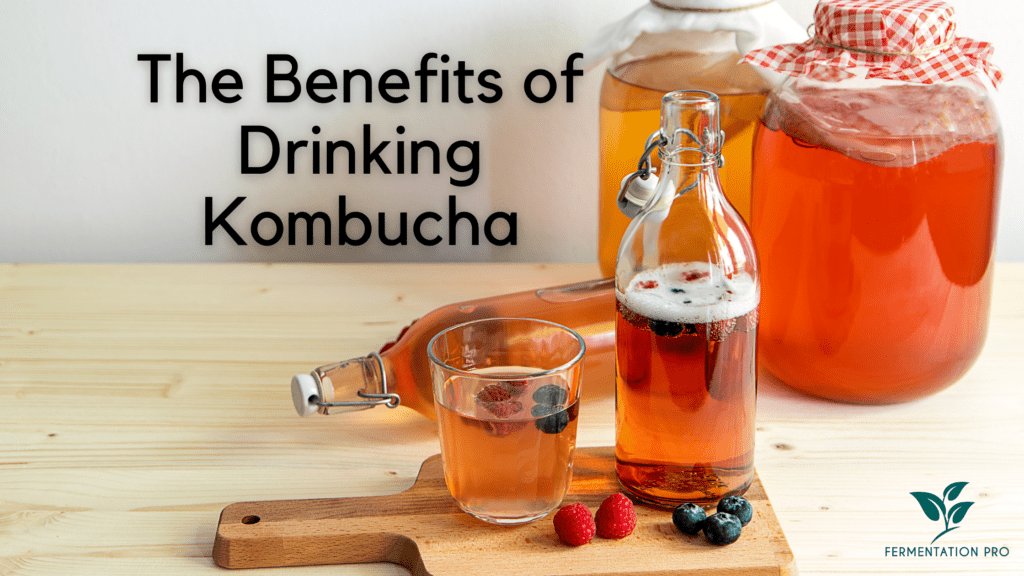Looking for an alcoholic drink but you’re conscious about the sugar and calorie content? May we introduce a healthy alternative to your usual hooch. Yep, you read it right! Kombucha is an exciting and versatile take on the usual tea since it suits almost every occasion! It’s a drink for which you’ll never run out of options.
Waking up thirsty in the morning? Having a lemonade-flavored booch not only does quench your thirst, but it’s also good for your empty stomach. While it improves your digestion, Kombucha is an excellent alternative for coffee to get that kick for the day.
And for the much-awaited night time event – Kombucha can transform into an enticing alcoholic drink. Although its alcohol content is pretty low but mixed with vodka, you’re about to be set for a fun night.
What Is Kombucha?
With the wide variety of Kombucha brands on the supermarket shelves to select from, it may be confusing for anyone to choose which bottle is the right drink for them. So, let’s get to the basics. Kombucha is a fermented and carbonated tea that may be flavored.
Is Kombucha Really Good For You?
Kombucha contains probiotics, B vitamins, and antioxidants, but the actual nutritional content varies depending on the brand and preparation method. Many store-bought varieties contain about 30 calories in one cup of serving – which is less than the sugar content in juices and sodas.
Sure, there are numerous benefits in the consumption of Kombucha because of the nutritional properties it harbors; still, like everything else, you should consume kombucha in moderation.
How Much Kombucha Can You Drink In A Day?
Experts say that it is okay for most people to sip on Kombucha every day but bear in mind that some individuals may not tolerate large amounts of Kombucha right away. Therefore, they can start drinking less per day and increase the volume based on their tolerance.
If you want to drink Kombucha without limitations, we recommend checking with your doctor first. Studies show that people with a compromised immune system and pregnant or breastfeeding women should stay clear of it because the drink’s live bacteria could cause harmful side effects.
Homemade Kombucha may also contain up to 3% alcohol. Buying Kombucha at a shop or online, on the other hand, is regarded as a safer option due to the controlled fermentation process and regulatory restrictions that limit the alcohol content to only 0.5%.
Negative Effects Of Kombucha
Everything has its pros and cons, and we do not exclude Kombucha from it. So before we talk about its benefits, it’s essential to know a few risks of and not limited to excess drinking.
Tip: Keep everything sanitary: the equipment, setting, and especially your hands.
Kombucha might increase the likelihood of tooth discoloration as it is highly pigmented. But this doesn’t mean you need to ditch it altogether.
Tip: To protect your teeth from discoloration, drink your Kombucha in one sitting rather than sipping it throughout the day; rinse your mouth with water after finishing.
Another possible side effect of excessive drinking in Kombucha is headaches. But, this is because Kombucha contains caffeine and alcohol, which alone or together might trigger headaches.
If you’re having multiple bottles of Kombucha per day, excessive drinking may lead to a dangerous condition called Lactic Acidosis. Accumulation of the acids in your bloodstream can lead to liver and kidney function problems.
While Kombucha contains less sugar than soda or processed juices, it is not entirely sugar-free like tap or unsweetened sparkling water. So to make sure you keep your calorie intake to a minimum, check the sugar content on Kombucha that you are purchasing.
Problems can surface if you are allergic to Kombucha tea. Issues like throat tightness, dizziness, shortness of breath, and nausea may occur after consuming the drink. It can also trigger other allergic reactions in some people.
The Benefits Of Drinking Kombucha

When you try Kombucha, you may find yourself craving this drink repeatedly. It helps with your digestion – boosts your energy, and clears your body toxins. It also improves your immune system, is an excellent source of probiotics and aids in preventing constipation. With all of the advantages, you may want to see Kombucha as an alternative to sugary drinks and sodas.
Here are some reasons why incorporating Kombucha into your diet can benefit your health in a variety of ways:
One of the main substances produced during the fermentation of Kombucha is acetic acid, which is also present in vinegar. Like the polyphenols in tea, acetic acid can substantially kill many harmful microorganisms.
On top of that, Kombucha has strong antibacterial properties, particularly against infection-causing bacteria and yeasts. These antibacterial effects deter the growth of harmful bacteria without negatively affecting the beneficial probiotic bacteria in kombucha.
Studies show that Kombucha can significantly improve markers of heart disease – bad and good cholesterol. In addition, green tea drinkers have up to a 31% lower risk of developing heart disease, a benefit that may also apply to Kombucha. Meanwhile, probiotics could also help reduce cardiovascular disease risk.
Tip: Drinking Kombucha made from green tea may also reduce the risk of prostate, breast, and colon cancers.
Kombucha acts to slow down the digestion of carbs, which reduces blood sugar levels in the body. It also improved liver and kidney function. Kombucha made from green tea is likely to be more beneficial, as green tea is excellent in reducing blood sugar levels.
Drinking probiotic-rich Kombucha could help promote better mental health. According to some studies, probiotics may have something to do to ease the signs of depression. There are also several correlations involving depression and inflammation, thus making Kombucha’s anti-inflammatory properties help alleviate some of the illness’ symptoms.
Proper Care To Maximize The Benefits
Kombucha is a probiotic-rich tea that can provide you with health benefits by nature. You can make it at home or opt to purchase. However, if you make it, make sure to do this sanitary and properly as contaminated Kombucha can cause serious health problems.
Tip: Unpredictable temperature fluctuations and light exposures happen; if you’re a homebrewer, we recommend using BoochSleeve – an innovative Kombucha brewing vessel cover made from high-quality neoprene.

The Future Of Kombucha
As much as Kombucha probiotics support gut health, the drink is not a substitute for a healthy diet. Consuming a diet rich in fiber from vegetables, nuts, and fruits is the most crucial factor to promote a healthy gut environment for these probiotics to flourish.
Nevertheless, there is a bright future for Kombucha, and that is something we would not argue with! The emergence of micro-breweries shows how successful this beverage is. So many young adults are captivated by this drink because who wouldn’t be?



26 Responses
Heya i’m for the first time here. I found this board and I find It truly useful & it helped me out a lot. I hope to give something back and aid others like you aided me.
Wow, fantastic weblog format! How long have you ever been blogging for?
you made running a blog look easy. The full glance of your site is fantastic, let alone the content material!
You can see similar here sklep internetowy